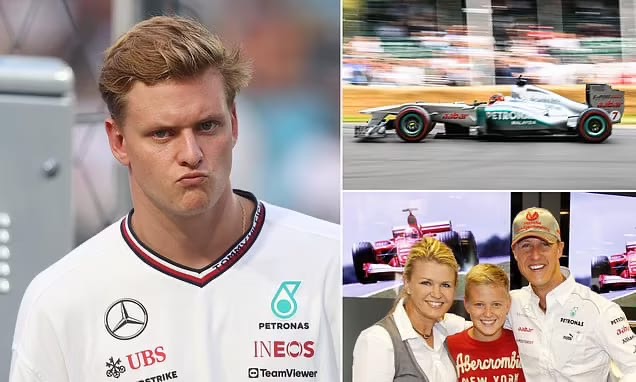At just 25 years old, Mick Schumacher, son of legendary Formula 1 driver Michael Schumacher, faces an uncertain future in the world of motorsport. Recently overlooked for the final 2024 seat, the young German driver could find himself in the F1 wilderness—a shocking twist for a racer who entered the sport with high expectations. With only reserve roles potentially on the horizon, Schumacher’s journey reflects the tough realities of a sport where talent, timing, and team politics are constantly at play.
Mick Schumacher’s journey to Formula 1 was marked by substantial promise and familial legacy. As the son of Michael Schumacher, a seven-time world champion, Mick carried not only immense pressure but also the high hopes of F1 fans who wanted to see the Schumacher name shine once more on the global racing stage. He displayed his talent in the lower formulae, notably winning the Formula 3 European Championship in 2018 and securing the Formula 2 Championship in 2020. These achievements underscored his potential and earned him a seat with the Haas F1 team in 2021.
Yet, despite his accolades, Schumacher’s time at Haas was filled with struggles. While he showed moments of brilliance, his time with the American team was marred by several high-profile crashes and inconsistency on the track. Partnered with the experienced Kevin Magnussen, Schumacher often found himself under pressure, both to perform at a high level and to keep his car damage-free. Haas’s team principal, Guenther Steiner, expressed concerns over the repair costs associated with Mick’s crashes, a factor that weighed heavily in their decision not to renew his contract after 2022.
With Haas releasing him, Schumacher found a new opportunity as a reserve driver for Mercedes, a team with deep ties to his father’s legacy. The move offered Schumacher a much-needed break from the pressures of the F1 grid while allowing him to stay close to the sport’s top teams. Working as a reserve, Schumacher contributed to the team’s car development and training simulations, earning praise from team principal Toto Wolff for his work ethic and adaptability. Schumacher remained hopeful that a new seat would open up in the future.
However, reserve roles only offer limited visibility, and the longer Schumacher is away from the grid, the harder it may be for him to secure a competitive seat. Compounding the issue is the increasingly competitive nature of F1, where younger, highly skilled drivers are continually emerging from the lower formulae, each vying for a limited number of seats.
Despite his hopes for a return, Schumacher’s ambitions suffered a blow when the final available seat for the 2024 season went to Daniel Ricciardo at AlphaTauri. Ricciardo, an eight-time Grand Prix winner and fan favorite, secured his spot, marking a decisive setback for Schumacher. The decision underscored the value that experience and marketability hold in F1, even if a driver like Ricciardo comes with a less-than-stellar recent performance record.
For Schumacher, the 2024 snub illustrates the harsh realities of the sport. Formula 1 is a business as much as it is a sport, and teams often favor experienced or marketable drivers who can bring both sponsorship opportunities and crowd appeal. Although Schumacher is a high-profile name, his lack of consistent points finishes and occasional struggles to adapt to race-day pressures have become liabilities that teams are hesitant to risk.
With no open seats on the 2024 F1 grid, Schumacher’s options are limited. Remaining with Mercedes as a reserve driver is likely, though it could be a stopgap rather than a path back to a full-time seat. The longer Schumacher spends on the sidelines, the more challenging it becomes to maintain his skills at a competitive level and stay relevant in the sport’s ever-changing landscape.
However, Mick Schumacher could consider several paths forward. One option might be to explore opportunities in other racing series, such as IndyCar or Formula E, where he could continue to hone his skills and build his reputation outside the intense spotlight of F1. Competing in another series would keep Schumacher sharp and potentially position him for a return if an F1 team requires a last-minute substitute or if a seat opens up for 2025.
Alternatively, Schumacher might remain in F1 as a reserve driver, hoping that his connections with Mercedes and consistent behind-the-scenes contributions will eventually open doors. Some drivers, like Esteban Ocon and Alex Albon, have found their way back to full-time seats after spending time in reserve roles. However, such comebacks are rare, and Schumacher may need to make difficult choices about his long-term aspirations.
Much of the media attention surrounding Mick Schumacher’s career has centered on his famous last name and the legacy of his father, Michael. While the Schumacher name initially helped Mick secure sponsorships and high expectations, it has also cast a shadow over his career, with constant comparisons to one of the sport’s greatest champions. Living up to such a legacy is a near-impossible task, and Mick has faced scrutiny that few drivers encounter.
Yet, Mick Schumacher has proven his resilience and dedication. The question now is whether he can find the right opportunity to showcase his potential. Though the future remains uncertain, Schumacher’s love for the sport and determination to make his own mark in racing are clear.
As Mick Schumacher faces the reality of not being on the F1 grid in 2024, his journey underscores the intense pressures, limited opportunities, and often unforgiving nature of Formula 1. Though the young driver may be cast into the wilderness for now, his path forward is not closed. Whether through persistence within F1 or a new chapter in another racing series, Mick Schumacher’s story remains compelling—and fans worldwide are eager to see where it will lead.
